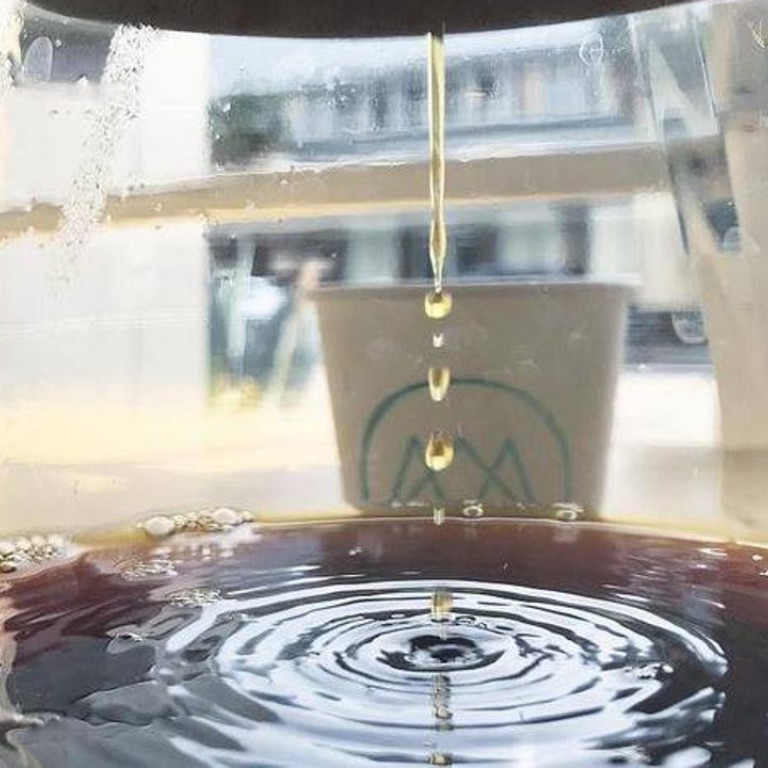
At this California cafe, patrons pay whatever they want. Remarkably, it isn’t losing money
One woman paid US$104 for her coffee at Metro Cafe, while a homeless man regularly pays US$1 for breakfast
Metro Cafe looks like a regular coffee shop: tables and chairs, Wi-fi, baristas, trays of pastries and a menu offering espresso, macchiatos, cappuccinos, lattes and other beverages.
But scan the menu for prices and you won’t find any. In this corner of Santa Monica, one of the most expensive cities in California, and therefore the US, you pay what you want.
“Every once in a while I pay just US$2 for my oatmilk latte,” Ron Kurti, a product designer and regular customer, said this week. “It’s an endorphin rush getting coffee so cheap. I’ve also given US$20. It depends.”
One woman paid US$104 for a coffee. Another customer, a homeless man, often breakfasts here for US$1. All, apparently, are welcome.
The two-year-old cafe abandoned prices last October in an experiment intended to last 30 days to see if well-heeled customers would pay more than usual to compensate for poor and homeless customers who paid less.
A very small percentage try to take advantage. We try to treat them with honour and respect
“After the 30 days, we’d matched what we had done before. So we continued,” said Snook. Revenue has remained stable – about US$12,500 per month, said Steve Snook, the cafe owner.
Staff said first-time customers tend to ask what prices used to be. About half then pay that. About a quarter pay more, the rest less.
“A very small percentage try to take advantage. We try to treat them with honour and respect,” said Snook. Donny Fox, 21, a barista, said he had braced for exploitation. “It hasn’t happened as much as I’d expected.”
It may sound like Karl Marx’s dictum – from each according to his ability, to each according to his needs – has finally breached the portals of capitalism, at least in this sleek, beachside outpost of Los Angeles. A progressive vibe has, after all, bequeathed nicknames like Soviet Monica and the People’s Republic of Santa Monica.
A Yelp reviewer attributed the business model to the generosity of “kind hipsters”.
Snook said the inspiration did indeed come from a bearded disrupter – Jesus. Snook, 58, is a pastor and the cafe is part of his church. “We want to run a good business but we don’t just make it about the bottom line. It’s about community and collaboration.”
The experiment is not unique. Businesses around the world have tried pay-what-you-want pricing, known as PWYW. But LA’s extreme inequality – the county has 58,000 homeless people with a Somalia-level average life expectancy (48), and a mansion on sale for US$500m – gives it added resonance.
Kurti, 42, said the absence of prices can initially baffle customers. “It weirds people out.” He usually pays US$4 plus US$1 tip for his oatmilk latte, about 20 per cent less than when prices were fixed. “It feels good to me because I don’t feel I’m ripping them off.”
I wouldn’t consider paying less … Because it would just be unreasonable. I like this place
Justin Germaine, 25, who works at a start-up, pays US$3.50 plus US$1 tip for his daily Americano, 50 cents more than before. “I think it brings out the good in people because people don’t want to screw them over. They’re nice.”
Michelle Mann, a visual effects photographer, said she usually paid US$4 plus US$1 tip for her Americano and croissant – a bargain by Santa Monica standards. “I wouldn’t consider paying less.” Out of embarrassment or guilt? “Because it would just be unreasonable. I like this place.”
Similar experiments elsewhere have met mixed results.
Of six PWYW restaurants highlighted in a 2014 Guardian travel guide, five remain open. The US restaurant chain Panera Bread turned five outlets into PWYW. Four closed, including one in St Louis earlier this month.
New York’s Metropolitan Museum of Art will in March partially abandon pay-what-you-want admissions by levying a mandatory US$25 fee on most adult visitors from out of state. It cited dwindling voluntary contributions, which now average US$9.
The San Francisco-based online clothing retailer Everlane appears to thrive in part by letting customers choose from a price range.
Critics mocked Radiohead’s pay-what-you-want pricing for the band’s 2007 album, In Rainbows. “Are you on ****ing crack? Do you really believe that’s a business model that works?” said Kiss’s Gene Simmons. However, later analysis suggested partial success.
Stephen King released a novel, The Plant, digitally in 2000, asking readers to pay US$1 for each chapter downloaded. “If you pay, the story rolls. If you don’t, the story folds.” It folded.

